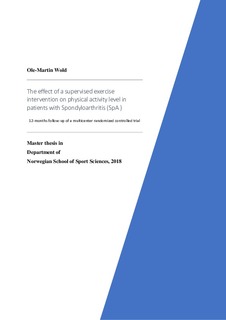| dc.description.abstract | Background: Exercise is an important part of the treatment for patients with axial spondyloarthritis (axSpA), both to limit the consequences of the disease and the risk of morbidities. Without proper treatment, the disease may have a great reduction on spinal stiffness together with physical function. Most studies investigating the physical activity level on patients with axSpA implies that they are less active compared to healthy controls.
Purpose: To investigate if there is a long-term effect of a twelve-week supervised exercise program with regard to physical activity level in patients with axSpA. Further, to examine which factors that may influence the level of physical activity.
Method: Patients diagnosed with axSpA was included in a randomized controlled trial. The exercise group participated in a 40-60 minutes exercise program three times a week for 12 weeks. Two of the sessions were supervised by a physiotherapist and one was home based. 12 months after the baseline assessment, physical activity level was assessed by using the selfadministered International Physical Activity Questionnaire-Short form (IPAQ-short). Differences between the groups at 12-months follow-up were analyzed with Mann Whitney U-test (non-parametric) for continuous variables, and chi-square for categorical variables. A logistic regression analysis was used to analyze factors associated with regular participation in cardiorespiratory and strength exercises at 12-months follow-up.
Results: The results showed there were no statistical differences in the total amount of physical activity (METs) between the two groups at 12-months follow-up (p=0.81). The exercise group reported significantly more physical activity (METs) on a vigorous intensity level compared to the control group (p<0.03) while the control group reported significantly more MET minutes per week spent on walking than the exercise group (p<0.02). Significantly more patients in the exercise group compared to the control group reported they performed cardiorespiratory exercises (<0.001) and muscular strength exercises (p<0.001) at 12-months follow-up. Univariate analyses showed that participation in regular cardiorespiratory and strength exercises at 12-months follow-up were significantly associated with younger age, having received the intervention (p=0.01) and experience with cardiorespiratory and strength exercises before the baseline assessment (p<0.001). The logistic regression analysis showed that exercise experience before the baseline assessment was the strongest predictor of exercise participation at 12-months follow-up.
Conclusion: The results from this study suggest that a 12-week supervised exercise program may have a long-term effect on exercise habits in patients with axSpA. A beneficial effect on participation in regular cardiorespiratory- and strength exercises and physical activity at a vigorous intensity level at 12-months follow-up were seen. Hence, more patients may take advantages of the health benefits associated with regular cardiorespiratory and strength exercises at a high intensity if they attend a 12-week supervised exercise program. However, there was no effect of the exercise intervention on total amount of physical activity and exercise experience before the baseline assessment was the strongest predictor of regular participation in cardiorespiratory and strength exercises at 12-months follow-up. | nb_NO |
